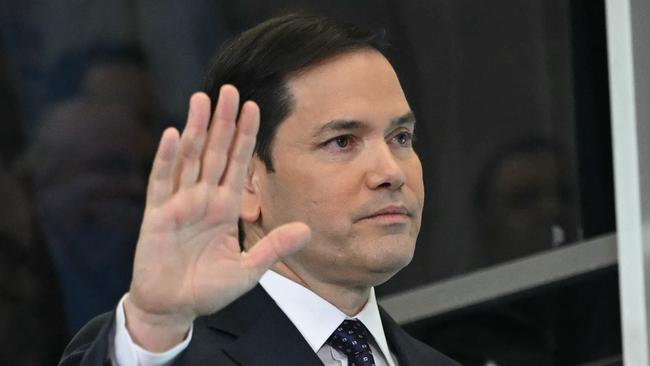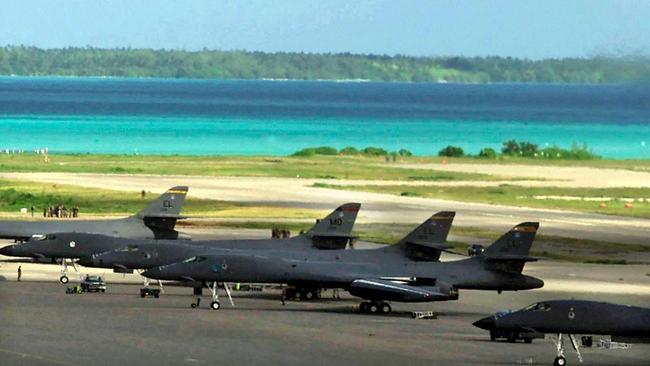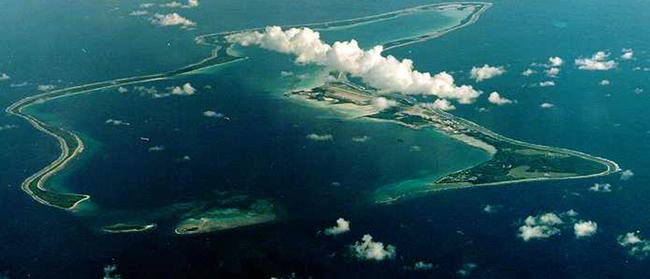Rubio warns of China’s “malign influence” in deal that threatens vital US base
Britain’s agreement to hand the Chagos Islands to Mauritius has also raised questions over the vulnerability of a 10,000km-long undersea fibre optic cable running from Perth to Oman.

US Secretary of State Marco Rubio has warned his British counterpart to beware of China’s “malign influence” in a veiled reference to its agreement to hand the Chagos Islands – an Indian Ocean archipelago that hosts America’s critical Diego Garcia military base – to Mauritius.
The British government agreed in October, with the blessing of former US president Joe Biden, to cede sovereignty over the islands to the African nation while maintaining control of Diego Garcia under an “initial 99-year lease”.
But the deal has been paused while the Trump administration considers the security implications of a move some analysts say leaves a vital US offshore base – home to nuclear-armed submarines and long-range bombers – vulnerable to Chinese surveillance.
The proposed handover has also raised questions over the vulnerability of a 10,000km-long undersea fibre optic cable running from Perth to Oman in the wake of a spate of cable sabotage incidents, though some experts say the Oman cable runs too deep to be susceptible.
The US military paid $US300m to divert a branch of the cable to Diego Garcia so that it did not have to rely solely on satellite communications.
Mr Rubio, a China hawk, has previously expressed concern the Chagos deal “would provide an opportunity for communist China to gain valuable intelligence on our naval support facility in Mauritius”.

He told Politico it posed a “serious threat to our national security interests in the Indian Ocean and threatens critical US military posture in the region”.
The issue is shaping up as a critical first test for the US-UK Special Relationship, with Mr Rubio emphasising in his first phone call with British Foreign Secretary David Lammy late on Tuesday the importance of a “free and open Indo-Pacific that is secure and stable”.
Diego Garcia has long played a vital role in regional and global security; both as a key staging ground for operations in the Middle East, including Iraq and Afghanistan, and to project air power across the Indian Ocean. Its importance – not only to the US but to its Quad partners Australia and India – has only increased as China has sought to raise its presence in the Indian Ocean, including through the establishment of its own military base in Djibouti.
Diego Garcia has a controversial history. Britain seized control of the Chagos Islands from its then colony Mauritius in 1965 and evicted more than 1000 people to make way for the US military base in exchange for a discount on nuclear submarines.
Mauritius, which won independence in 1968, has always maintained it owns the islands, which have been under French and then British control for more than 300 years.
Decolonisation champions say Britain’s refusal to hand back Chagos has exposed the hypocrisy of Western powers and their allies who champion the importance of a rules-based international order except when it is inconvenient for them.
Mauritius was able to successfully exploit that weakness, with strong support from Russia, in a campaign that led to a 2019 International Court of Justice ruling in its favour over the islands.
Britain’s Starmer government insists the new treaty – details of which remain largely opaque – is the best way to safeguard the remote Diego Garcia, a view supported by the Indian government.

Security analysts are divided over the deal. Some insist it secures the base’s tenure and major delays in its enactment could push Mauritius further into Beijing’s waiting arms.
Others warn it undermines Diego Garcia’s security by paving the way for Mauritius to exploit surrounding waters through the sale of fishing and navigation rights.
“As the base is home to US long-range bombers, (Diego Garcia) is of considerable interest to China,” Royal United Services Institute defence analyst Jack Watling wrote recently.
“Beijing uses its fishing fleet as the eyes and ears of its military, with Chinese fishing boats routinely equipped with sensors and communications equipment to monitor other countries.
“There is a significant risk that such vessels will soon ply the waters around the base.”
Anna Powles, a security studies professor at New Zealand’s Massey University, agreed the treaty could “provide an opportunity for China to effectively build a permanent presence through its fishing fleet in Mauritian waters, which is obviously a significant concern”.
“China’s fishing fleet in the Pacific based out of Suva has a well-known and longstanding role in intelligence gathering in the region and there is no reason to believe it would be any different … given the proximity to Diego Garcia,” Professor Powles said.
Mauritius’s economic vulnerabilities and its recent history of “flip-flopping” between Indian and Chinese influence only compounded concerns it could be open to economic inducements from Beijing, she added.
Mauritius was the first African country to sign a trade deal with China in 2019 but also has a long relationship with New Delhi, which sees Beijing’s push into the Indian Ocean as a threat to its traditional dominance there.




To join the conversation, please log in. Don't have an account? Register
Join the conversation, you are commenting as Logout